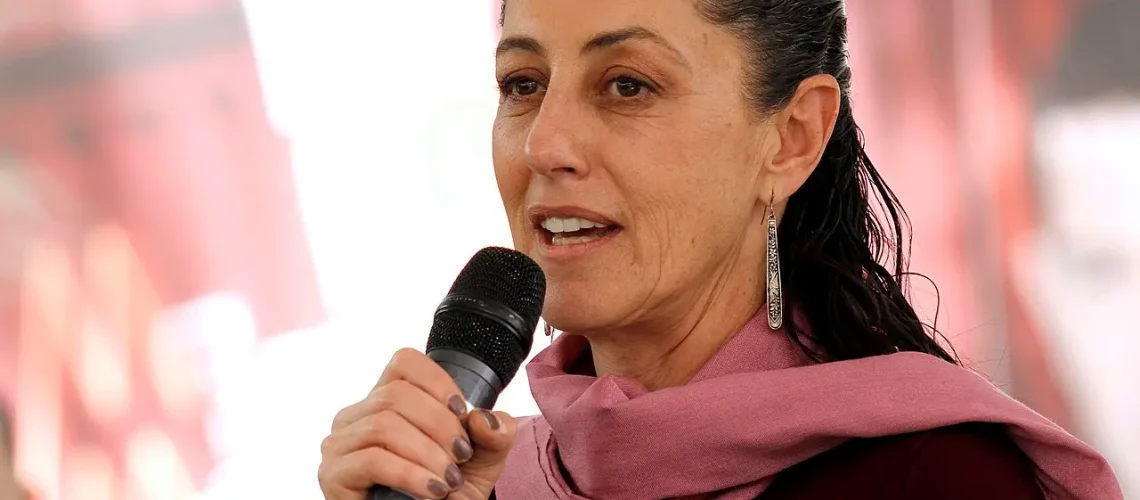Claudia Sheinbaum Pardo has made history: as the first woman and the first person of Jewish descent to assume Mexico’s highest office. Born in 1962 in Mexico City, the physicist and environmental scientist served as Mayor of Mexico City from 2018 to 2023 and symbolizes for many a new era in Mexican politics. With a landslide victory of almost 60% of the vote in June 2024, she began her six-year presidential term on October 1, 2024. This blog post traces her career, political positions and challenges, as well as the hopes and criticisms surrounding Mexico’s new Presidenta.
Career and Academic Background
Claudia Sheinbaum was born on June 24, 1962, in Mexico City to Annie Pardo, a biology professor, and Carlos Sheinbaum, a chemical engineer. Her paternal grandparents came from Lithuania, and her maternal grandparents from Bulgaria; the family is of Jewish heritage, although Sheinbaum herself is non-practicing. Raised in an academic environment, she studied physics at the National Autonomous University of Mexico (UNAM) and earned both a master’s degree and a Ph.D. in energy engineering. Part of her doctoral research was conducted in the early 1990s at the Lawrence Berkeley National Laboratory in California, where she analyzed Mexico’s energy consumption trends compared to industrial nations. From 1995 onward, Sheinbaum lectured as an engineering professor at UNAM while already becoming politically active during her university years, participating in student movements in the late 1980s and 1990s.
A milestone in Sheinbaum’s scientific career was her contribution to the Intergovernmental Panel on Climate Change (IPCC). She contributed to the 2007 and 2014 climate reports and was part of the team awarded the Nobel Peace Prize alongside Al Gore in 2007. Her expertise in energy efficiency and sustainability gained her national recognition and established her reputation as a climate protection expert within politics.
Political Rise in Morena and Career Path
Sheinbaum officially entered politics around the turn of the millennium. In 2000, the newly elected mayor of Mexico City, Andrés Manuel López Obrador, appointed her as his Secretary of the Environment. In this role, Sheinbaum left her mark by advancing the introduction of a modern bus rapid transit system (Metrobús) and contributing to the expansion of the city’s ring road (Periférico). These infrastructure projects provided her with initial administrative experience and strengthened her political alliance with López Obrador, who would become her mentor.
After López Obrador’s term ended, Sheinbaum returned to academia for a time, continuing her work on climate protection projects. In 2015, she won her first elected office as Mayor of the Tlalpan borough of Mexico City. She became known for advocating water rights and sustainable urban development. However, her term was not without controversy, particularly following a devastating 2017 earthquake in which buildings collapsed in Tlalpan, leading to criticism over construction oversight and disaster preparedness.
Her rise continued unabated: In 2018, Sheinbaum ran for and won the election for Head of Government (Mayor) of Mexico City under the banner of the newly founded leftist party Morena (Movimiento Regeneración Nacional) with about 50% of the vote. As the first woman and first person of Jewish heritage to lead the megacity, she prioritized environmental and transportation reforms. Her administration installed rainwater harvesting systems, improved waste management, and launched urban reforestation programs. She also announced an ambitious plan to modernize the city’s aging subway system through significant investment. However, her reputation suffered a setback in 2021 when a subway overpass collapsed, killing 26 people — a tragedy highlighting the poor maintenance of infrastructure and placing political pressure on Sheinbaum as the then-mayor.
In June 2023, Sheinbaum stepped down early from her position in Mexico City to focus on her 2024 presidential campaign. She won Morena’s internal primaries against rivals such as former Foreign Minister Marcelo Ebrard and entered the presidential race as the candidate for the ruling leftist coalition. In the historic election on June 2, 2024, Sheinbaum achieved a sweeping victory: with 59% of the vote and a 32-point lead over her nearest competitor, she secured the highest vote share for a candidate since 1982. This result paved the way for her inauguration on October 1, 2024, as Mexico’s first female president.
Leadership Style and Personality
Claudia Sheinbaum is regarded as a pragmatic, analytical, and disciplined politician. In contrast to her predecessor López Obrador, known for his folksy rhetoric and charismatic persona, Sheinbaum presents herself as more technocratic and data-driven. Observers describe her as “unflappable” — qualities that serve her well in times of crisis. A clear example was her management of the COVID-19 pandemic in Mexico City: while President López Obrador downplayed the importance of testing and mingled with crowds, Sheinbaum massively expanded testing capacity and promoted early adoption of social distancing measures. This science-based approach earned her praise and highlighted her responsible leadership compared to the federal government.
In terms of character, Sheinbaum is often seen as less impulsive but also somewhat resistant to external advice and highly focused. Her longstanding loyalty to López Obrador — standing by his side for over 20 years — reflects her party discipline. However, critics argue that she sometimes lacks charisma and struggles to establish the same emotional connection with the populace as her predecessor. Nevertheless, she enjoys a reputation as an honest and competent leader who aims to translate scientific expertise into practical governance.
Popularity Among Mexicans
Sheinbaum began her presidency with impressive popular support. Her electoral victory was based on her ability to appeal to voters across almost all demographic groups — men and women, young first-time voters, workers, and rural populations alike. Only among entrepreneurs and highly educated voters did she perform less well, but these groups represent a small segment of the electorate. A key factor behind her popularity is her close alignment with López Obrador’s governmental program. During his six-year presidency (2018–2024), significant social improvements were achieved: the minimum wage was substantially increased, and around 5.1 million people were lifted out of poverty — the largest drop in poverty rates in 16 years. Sheinbaum embodied the continuation of this “Fourth Transformation” and pledged to maintain and expand her predecessor’s successful social programs. These initiatives — from direct cash transfers to seniors to scholarships for students — helped millions of Mexicans and built a loyal voter base.
Accordingly, Sheinbaum’s approval ratings remained high in the months following her inauguration, consistently staying above 75% according to polls. Her ruling coalition (Morena and allies) also enjoys a comfortable majority in Congress, including a supermajority in the Chamber of Deputies and nearly two-thirds of the Senate. This strong mandate provides Sheinbaum with significant political support to implement her agenda and reflects her popularity among the people. Many Mexicans place great hopes in her as the first woman to lead the nation — particularly in a country still grappling with machismo and high rates of violence against women. Her presidency thus stands symbolically for social progress and a new generation of leadership.
Especially among poorer and rural populations, as well as the urban working class, support for Sheinbaum remains strong.
They trust that “La 4T” (the “Fourth Transformation,” López Obrador’s reform project) will continue under her leadership. As former mayor of the capital, Sheinbaum also won over many residents of Mexico City by addressing everyday issues like traffic and pollution. This blend of political continuity and hands-on experience made her attractive to a broad electorate. Her popularity is thus rooted both in identification with López Obrador’s achievements and in her own regional track record.
Fight Against Drug Cartels
One of Claudia Sheinbaum’s greatest challenges is the ongoing drug war and violence perpetrated by powerful cartels. Mexico has suffered from high crime rates for years — in 2024, public security ranked at the top of voter concerns according to polls. Sheinbaum has announced that her strategy against the cartels will focus primarily on addressing the root causes of crime. Following the motto “Abrazos, no balazos” (“hugs, not bullets”) like her predecessor, she aims to emphasize social policies over purely military repression. Specifically, her government plans to expand education and employment programs for young people to cut off the cartels’ recruitment base. At the same time, she intends to increase the presence of security forces — including expanding the National Guard and intensifying its deployment in violent hotspots. This dual strategy of prevention and security is intended to curb violence over the long term.
The challenge remains immense: organized crime syndicates wield considerable influence and financial power across many regions of Mexico. They not only control drug trafficking but also extort local businesses — from gas stations to avocado farms. Any government daring to challenge their dominance risks violent retaliation. Sheinbaum must therefore act cautiously yet decisively. Early signs send mixed signals: according to government figures, the number of homicides in the first months of her administration fell by about 9% compared to the previous year — seen as a success. Yet the overall level of violence remains high, and critics warn that without profound reforms, the security apparatus may remain ineffective. Another legacy of López Obrador — the strong deployment of the military in internal security — continues under Sheinbaum, even though militarization has so far failed to significantly reduce cartel violence. The fight against the cartels will be a risky balancing act for Mexico’s president, and its outcome will heavily shape her presidential course.
International Challenges
On the international stage, President Sheinbaum primarily faces the complex relationship with the United States. Given the economic ties and migration issues, the relationship with the northern neighbor is of utmost importance for any Mexican administration. Sheinbaum pursues a pragmatic course: while emphasizing Mexico’s sovereignty, she seeks cooperation to solve shared problems. She has made it clear that Mexico will continue to help curb migrant flows toward the U.S. border — a longstanding demand from Washington. At the same time, she plans to use this cooperation as leverage to secure U.S. concessions on trade or investment matters.
A particular challenge could arise from the resurgence of Donald Trump. The former U.S. president has previously made headlines with confrontational rhetoric toward Mexico. After Trump was re-elected as U.S. president at the end of 2024, Sheinbaum responded to provocative tones from Washington with a mix of confidence and humor. For example, when Trump suggested renaming the Gulf of Mexico to the “Gulf of America,” Sheinbaum dryly retorted that, in that case, all of North America could be renamed “América Mexicana” (Mexican America). This sarcastic remark, made during a press conference before a world map, drew international attention and showed Sheinbaum’s willingness to counter disrespect with wit. Observers saw it as a clever move: “Humor can be a good tactical tool; it projects strength — something Trump reacts to.” Nevertheless, Mexico’s new leadership understands that humor alone will not suffice. In tough negotiations over migration, anti-drug efforts, and trade, Sheinbaum plans to firmly defend Mexico’s interests. She clearly stated that she would not accept threatened U.S. tariffs and would respond with countermeasures if necessary. Overall, Sheinbaum signals that Mexico, under her leadership, will be cooperative but by no means submissive to foreign powers.
Beyond the U.S., Sheinbaum continues to nurture Mexico’s relations with other countries — from regional partners in Latin America to trade partners in Europe and Asia. Her government places special emphasis on climate diplomacy, fitting her academic background, and supports international climate agreements. She also faces the task of reassuring international investors whose confidence was shaken by some controversial reforms, such as López Obrador’s judiciary reform. Here, Sheinbaum must strike a balance: communicating internal changes without casting doubt on Mexico’s rule of law and economic stability abroad. In short: on the world stage, she aims to position herself as a calm yet assertive representative of Mexico.
Criticism and Controversies
Despite early accolades, Claudia Sheinbaum also faces criticism. One major concern for human rights organizations is her handling of Mexico’s ongoing violence crisis. While Sheinbaum emphasizes the importance of social programs, she — like her predecessors — relies heavily on the military and the National Guard for internal security. Experts warn that militarization, which increased significantly under López Obrador, has not led to substantial improvements in public safety. On the contrary, serious human rights violations by security forces — including extrajudicial killings, forced disappearances, and abuses against migrants — have continued. Critics therefore call on Sheinbaum to demand greater transparency and accountability from security forces and to gradually withdraw the military from civilian policing tasks. Whether Sheinbaum, who campaigned on promises of continuity, will be willing to correct this course remains to be seen.
Sheinbaum also faces scrutiny on civil rights and gender-based violence issues. Mexico has one of the highest femicide rates in the world, and although Sheinbaum announced plans to establish a special prosecutor’s office for combating femicides, feminist groups criticize her government program for lacking gender-specific measures. During her time as mayor, Sheinbaum was criticized for her heavy-handed response to feminist protests demanding justice for murdered women. She will need to prove that, as Mexico’s first female president, she takes the concerns of the women’s movement seriously.
Another major point of criticism concerns her close ties to López Obrador. Opponents claim Sheinbaum acts merely as a caretaker for her popular predecessor, continuing his controversial decisions without sufficient scrutiny. Indeed, Sheinbaum has incorporated many of López Obrador’s cabinet members into her own government, including key figures in finance, security, and foreign policy. She must also oversee the controversial judiciary reform pushed through by López Obrador at the end of his term, which mandates the dismissal of all federal judges and the future election of judges by popular vote. Critics see this reform as a threat to judicial independence and a weakening of the separation of powers. Here, Sheinbaum faces a dilemma: remaining loyal to the “Fourth Transformation” while protecting Mexico’s young democracy. Both her opponents and some supporters expect her to assert her independence and distinguish herself from López Obrador’s shadow.
Ultimately, Sheinbaum will be judged by her governance: Can she curb corruption and ensure transparent administration? Can she manage ambitious infrastructure projects efficiently and without favoritism? As mayor, she already experienced how quickly large public works projects can draw criticism — such as the still unfinished Texcoco airport (canceled by López Obrador) and the costly Dos Bocas oil refinery project, which Sheinbaum praised as “majestic” despite delays. In these cases, it will become clear whether Sheinbaum can uphold transparency and effectiveness or whether old problems will persist.
Claudia Sheinbaum’s journey from university lecture halls to the pinnacle of Mexican politics is remarkable. As a physicist and climate scientist, she brings a unique background to the presidency, combining it with years of political experience. Her historic election as the country’s first female president signals societal change and raises high expectations. While Sheinbaum enjoys strong popularity and a broad mandate, she faces monumental tasks: confronting the drug cartels without plunging the country into new cycles of violence, reducing social inequality without overburdening public finances, and strengthening democracy while remaining aligned with the “Fourth Transformation.”
In the coming years, it will become clear whether Claudia Sheinbaum can master this balancing act. Mexico stands at a crossroads — and its first female president embodies the country’s hope for a new chapter. With a cool head, scientific approach, and broad public support, Sheinbaum has the opportunity to bring about lasting change. That she will face major challenges and resistance is certain. But already it is clear: Claudia Sheinbaum’s presidency will be remembered as a time of historic transformation and critical tests for Mexico’s future.
Photo: Secretaría de Cultura Ciudad de México from México






